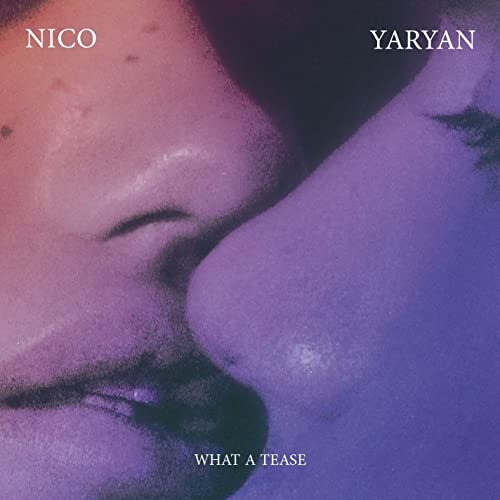
Cover of Nico Yaran’s single “I’ll Stay With You When You Die” from the
album “Tease”
Credit: amazon.com
Nico Yaryan is longing on his 2016 debut album “What a Tease.” The whole album is fueled by heartbreak retold nearly identically in the scant press covering the album’s release. As the story goes, Yaryan fell in love with a Dutch student while touring Europe with a friend’s band in 2012. Shortly after the tour, he started working on a marijuana farm to fund trips to and from Amsterdam. Ultimately, the relationship couldn’t survive long-distance, and he channeled the swirling emotions into a sparse record that reverberates with the singer-songwriter’s low register.
While the album longs, a hopeful desperation can be found on individual tracks like “I’ll Stay With You When You Die.” It is the least famous song on the album, as much as a song can be when it’s performed by a musician who keeps his online presence to a bare minimum these days — a mystique that works for more established artists, but one that appears to be an intentional sidestep out of the limelight for Yaryan. Other tracks like lead single “You Belong to Me” total in the seven figures of streams and are more standard lovelorn fare. “I’ll Stay With You” is chiefly concerned with decomposition and a love that Yaryan intends to last far longer than his partner’s physical body.
He asserts this throughout the song’s intro, chorus and outro. “I’ll stay with you when you die / I’ll never leave you alone / I’ll be right by your side.” He’s steadfast in his bedside watch, a post taken up by a determined lover. The devotion is touching even if it’s ultimately for naught. It’s tempting to attribute this to young love, and it’s easy to see where you can draw that conclusion. However, the imagery in the song doesn’t conjure the empty platitudes commonly littered throughout love songs — the “I’d die without you” or, in the immortal words of Sean Kingston, “they got me suicidal / when they say it it’s over.” Yaryan wishes to die with his love and be there for her in the end.
His view of death avoids the macabre even if he accepts the physical reality of it. He calls it a “return” to where she is from and emphasizes the cyclical nature of life as he notes that they’ve “only just begun.” He isn’t mournful about their eventual end. He is reassuring and hopeful that they can make it that far. Even once the decay sets in and the “bugs will crawl over [her] toes,” he won’t leave her side. He needs to stay there to charter her across the threshold in the next verse:
And the moon will rise
And I’ll put pennies on your eyes
I’ll stay right next to you
No need to wonder why

Yaryan’s sparse record brings his touching lyrics to the forefront of “I’ll Stay With You When You Die”
Credit: Paste Magazine
His love and devotion are a foregone conclusion to him, and he wants to communicate that to his still-alive lover. He cites an ancient tradition of leaving coins with deceased loved ones so they can pay their fare to the underworld. Ancient Greeks needed drachmas to cross the River Styx, and people from Parthia (modern-day Iran) to Northern Europe have been found at burial sites with coins placed in their mouths. By calling on this tradition, Yaryan invokes centuries of care for the dead and a malleable understanding of the afterlife, perhaps as a place where one could someday visit and see their loved one again.
When viewing the construction of the song in the larger context of a break-up album, it seems to Yaryan that the true tragedy is not the death of the partner but the death of the relationship. Of course, we are presented with a one-sided view of things. Titles like “You Belong With Me” and “Your Love Never Lets Me Down” present absolutes of being and an almost possessive confidence in the relationship’s survival over distance and time and all the other cracks that could have led to the eventual downfall. “I’ll Be With You” presents another kind of confidence. Confidence that his love will last beyond the physical realm and that perhaps in the afterlife or even another life they can meet again, the feeling having endured after all.
Yaryan may have moved on and become quite happy with someone else, but what he captured in “I’ll Be With You” may very well outlast all of us while the bugs crawl across our toes and we’re thankful for the delicately laid coins to ferry us along Charon’s final ride.

 “I’ll Stay With You When You Die” by Nico Yaryan
“I’ll Stay With You When You Die” by Nico Yaryan


 “Help Me, Helen”
“Help Me, Helen”
 Recovering Cremation Remains After the Los Angeles Fires
Recovering Cremation Remains After the Los Angeles Fires















